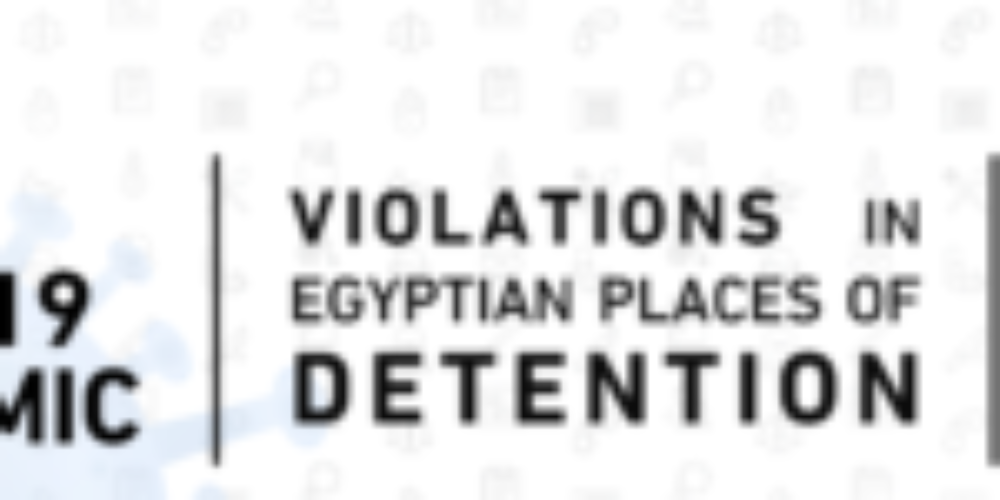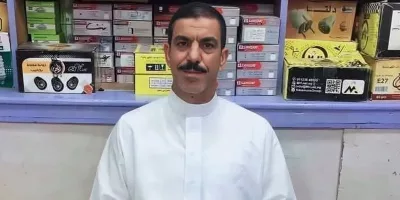Committee for Justice issues a report on human rights violations inside the Egyptian Places of Detention in March-April 2020 amid the outbreak of Coronavirus
Committee for Justice (CFJ) considers its main mission to contribute to the protection and defence of victims of human rights violations- with a focus on the MENA region. To this end, CFJ monitors and collects the necessary information and seeks to provide a highly credible overview of the human rights situation in the region. Our methods constitute observing, documenting, and verifying violations and keeping pace with developments in policies and practices, especially in countries with a dearth of information and restricted access to human rights abuses.
Following CFJ’s previous periodic reports on human rights violations against individuals who are under the custody of law enforcement officers and security agencies in the Egyptian places of detention, this report proceeds to provide an analytical overview of the human rights situation in Egypt during March and April 2020; with focus on circumstances surrounding, and speeding, the spread of Covid-19 virus inside the places of detention and consequences on prisoners/detainees and their families’ rights.
Ahmed Mefreh, executive director of CFJ, said that the organization in its annual report has warned the Egyptian government against continuing to ignore the health conditions inside prisons and places of detention in light of the outbreak of coronavirus pandemic first in China then around the world. According to our estimations, the pandemic has reached 28 places of detention in 8 governorates, claimed the lives of 10 detainees and prison staff members, in addition to 133 confirmed and suspected cases which include 109 detainees, 22 police officers, and 2 staff members.
He added that these figures come despite a decisive media and security blackout and prevention of communication with the outside world through family visits in all places of detention, stressing that the Egyptian government is fully responsible for what has become the situation now.
Report Findings:
Overall, CFJ documented 201 violations under ‘poor detention conditions’ in 15 governorates during the report duration. Among the most notable findings:
1- Lack of healthy detention conditions and interruption of communication with the outside world
According to testimonials documented in March 2020, detainees in Tora Prisons Complex, southern Cairo, lack protection and hygiene tools. Two weeks after the closure of family visitation, detainees ran out of hygiene tools received through visits, while the prison authority have not provided much, and if they do, the provide incredibly poor and simple supplies.
The report also documents the interruption of detainees’ contact with the outside world as a result of the Interior Ministry’s decision to ban all social and legal visits in light of the panic and fear of the spread of the coronavirus. It also documents the unavailability of clean water but for two hours a day, only, which is not sufficient for cleanliness and personal and public care.
The report warned that minimum safety and health standards within the detention facilities are not available; sunlight does not enter into cell rooms, exercise is allowed only one hour a day, treatment is not available, and it is fairly difficult to go to hospital, all leading to decreased immunity and warns of a possibly rapid spread of the virus among prisoners/detainees.
2- Overcrowding: a time bomb
Although the number of prisons and detention Top of Form
facilities have increased since 2013, more than 114,000 prisoners are still crammed into detention facilities at rates that are far beyond their capacity.
In March and April, our team documented 33 incidents of overcrowding and poor ventilation in detention facilities, which varied between police stations and central/public prisons.
Prior to the pandemic, overcrowding was associated with a policy of expanding prolonged pretrial detention and slowing down of litigation procedures. The situation is no different after the outbreak of coronavirus, with some 30,000 people arrested in April alone for violating the curfew, according to official data. Also, the suspension of all hearings since mid-March – both in criminal trials and in hearings for renewal of detention- has resulted into more overcrowding in the places of detention.
3- Ill-treatment
During the reporting period, CFJ documented 159 abuses sorted under six main categories, in addition to overcrowding and poor ventilation. Of these, 110 violations took place in at least 19 places of detention in March, while 49 violations occurred in at least 10 detention facilities in April 2020.
4- Denial of medical care
In spite of the Egyptian authorities’ claims before international forums that they are keen to provide health care to prisoners, the facts observed and documented by CFJ since July 2013 point to a systematic pattern of denying detainees and prisoners of conscience health care priorities, regardless of age, ideology, degree of injuries, and the types of diseases they suffer, leading to their death in many cases.
In March and April 2020, CFJ team documented the deaths of 11 individuals in nine different places of detention due to denial of medical care, as well as the deaths of three individuals due to poor conditions of detention (in general). Meanwhile, forty-two violations under denial of health care were documented during March and April.
CFJ recommendations
- To reduce overcrowding inside detention rooms; provision of clean water, hygiene tools, disinfectants, and good nutrition; allow prisoners’ exercise hours, and designate isolation rooms inside the places of detention.
- To restrict the use of pre-trial detention; activate alternative measures guaranteed by article 201 of the Code of Criminal Procedure- e.g., house arrests; enumerate the number of chronic patients among all remand detainees and release them under any security guarantees- including the installment of electronic bracelets in their wrists.
- To enumerate the number of prisoners/detainees who suffer from life-threatening diseases or illnesses that make them particularly vulnerable to Covid-19, release them, postpone the implementation of penalties, and activate article 486 of the Code of Criminal Procedure.
- To release elder, pregnant, breastfeeding, indebted detainees and those sentenced for minor offenses, while taking necessary precautions and measures – e.g., banning them from travelling abroad.
- To expand pardons to elder, patient, pregnant, and breastfeeding prisoners as well as individuals convicted for political reasons.
- To quit all enforced disappearance practices and release all forcibly disappeared.
- To screen all newly detained individuals, expand tests among prisoners, and isolate suspected cases, without forcing them into solitary confinement.
- To screen all officers and staff members who communicate with the prisoners and disinfect the prisons’ facilities and prisoners’ belongings on a regular basis.
- To quit probation measures from inside police stations, replace them with measures undertaken from individuals’ homes, respect what the law has accorded, and install electronic bracelets to control the suspects/convicts’ movement- if necessary.
- To equip the prisons’ hospitals with respiratory devices, medical devices, and highly qualified medical teams to combat the disease and treat infected cases.
- To allow prisoners to bring in cleansers, masks, clean clothing, medicines, and food, and sanitize them all before entering the places of detention.
- To allow prisoners and detainees to undertake phone calls and send and receive telephone messages as accorded by article 38 of the Prisons’ Regulation Code.
- To enable family visits through glass cabinets and phone devices, as is the case in Tora Maximum Security prison II.
- The Attorney-general must undertake an effective inspection of all places of detention, and allow representatives of the Doctors’ syndicate, Ministry of Health, as well as national and international civil society organizations to monitor the places of detention and ensure: (a) the proper provision of medical care; (b) the regular screening of prisoners/detainees and officers, (c) the cleanliness and sterilization of detention facilities and (d) the prisoners/detainees’ safety.
- To abolish the imprisonment sentence for violating the curfew order, as means to reduce overcrowding inside the places of detention.
- To transparently publish infection and mortality statistics inside the places of detention, whether among prisoners, officers, or staff members.






